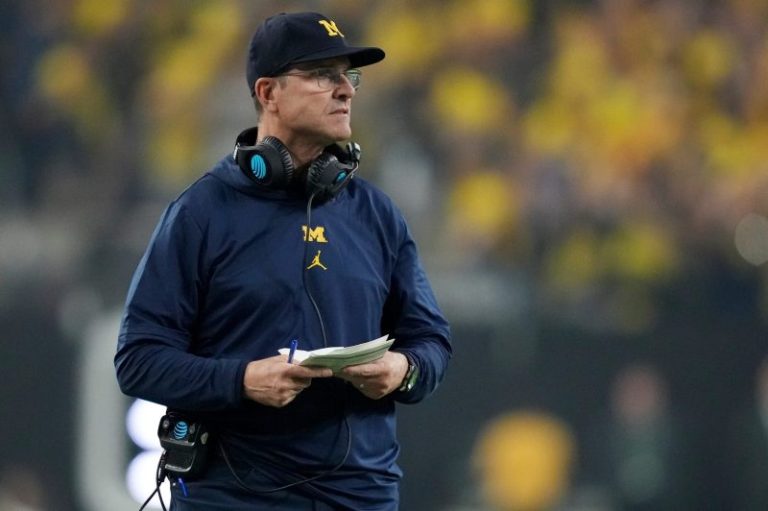The NCAA is handing out four different show-cause orders to the four people most involved in the Michigan football team’s sign-stealing scandal in 2023.
The show-cause orders are against former Wolverines Connor Stalions, Jim Harbaugh, Denard Robinson and current head coach Sherrone Moore.
A program seeking to hire someone with an active show-cause would have to appear before the NCAA’s committee on infractions and make a strong case why it specifically wants to hire the person.
The NCAA announced Friday it was handing out four different show-cause orders to the four people most involved in the University of Michigan football team’s sign-stealing scandal in 2023.
But what is a show-cause order? And who is it affecting?
The NCAA’s announcement on Aug. 15 of sanctions against the Michigan program included penalties for four people associated with the scandal: Connor Stalions, the former Michigan defensive analyst who orchestrated much of the illicit ‘off-campus, in-person scouting scheme;’ Jim Harbaugh, former Michigan head coach and current Los Angeles Chargers head coach; Denard Robinson, former assistant director of player personnel for Michigan; and Sherrone Moore, Michigan’s active head coach.
Here’s what to know about the show-cause orders imposed on each of them:
Who was penalized by the NCAA for Michigan’s sign-stealing scandal?
The NCAA announced its sanctions for Michigan’s illicit activities in the 2023 season on Friday.
Here are the four active or former personnel members of the Michigan football program hit with sanctions for their involvement in the Wolverines’ sign-stealing scandal and what their penalties are, per the NCAA:
Former defensive analyst Connor Stalions: Eight-year show-cause order
Former head coach Jim Harbaugh: 10-year show-cause order, which begins Aug. 7, 2028 after the conclusion of a current, four-year show-cause order from a previous rules violation.
Former assistant director of player personnel Denard Robinson: Three-year show-cause order
Current head coach Sherrone Moore: Two-year show-cause order, plus a three-game ban. Michigan self-imposed a two-game ban for Moore during the 2025 season, which he will serve in Weeks 3 and 4 (vs. Central Michigan, at Nebraska) this year. The NCAA also imposed its own one-game ban for the Wolverines’ first game in the 2026 season (vs. Western Michigan in Germany).
All three former members of Michigan’s football program are not currently employed by a college football program and are restricted ‘from all athletically related activities during the show-cause period.’
Moore, who is Michigan’s active head coach, did not receive the same prohibitions.
The football program as a whole also received its own list of penalties. They include four years’ probation, a ‘multimillion-dollar fine’ and certain prohibitions on recruitment: ‘a 25% reduction in football official visits during the 2025-26 season’ and ‘a 14-week prohibition on recruiting communications in the football program during the probation period.’
What is a show-cause order?
A show-cause order is essentially a college football-wide ban on hiring a person to join their coaching staff.
If Michigan or any other college football program wanted to hire Stalions, Harbaugh, Robinson or Moore (or any other person with an active show-cause), it would have to appear before the NCAA’s committee on infractions and make a strong case for why it specifically wants to hire one of them.
The name ‘show cause’ comes from the case that the prospective employer must make to the NCAA, showing cause for why previous infractions will not happen again if a previous offender is hired at a new program.
Show-cause orders are a somewhat common penalty imposed on coaches or other personnel found to have violated major rules.
Other recent/active show-cause orders in college athletics
Here are a few other examples of recent or active show-cause orders in college sports:
Kelvin Sampson, 2008: The former Indiana head basketball coach and current Houston head coach received a five-year show-cause for NCAA violations during his time at Indiana, including impermissible calls to recruits.
Bruce Pearl, 2011: The former Tennessee head basketball coach and current head coach at Auburn received a three-year show-cause for lying to the NCAA about hosting a recruit during a cookout at his home.
Jim Tressel, 2011: The former Ohio State head coach received a five-year show-cause for failing to report NCAA violations involving his team’s players.
Jeremy Pruitt, 2023: The former Tennessee head football coach received a six-year show-cause for providing impermissible benefits to recruits during his time coaching the Volunteers. Pruitt’s show-cause is still active and runs through July 13, 2029.

